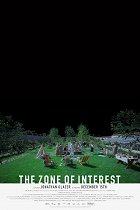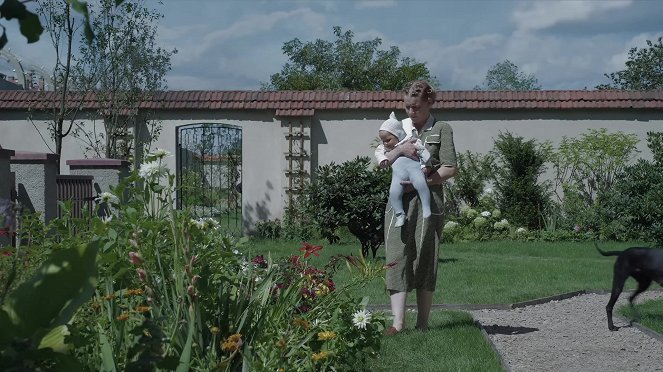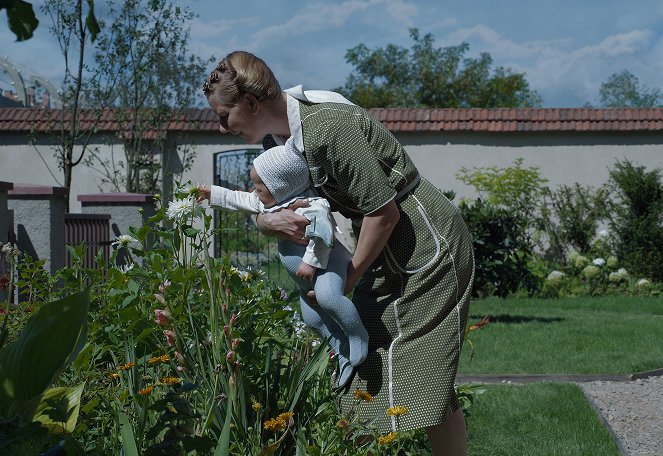Directed by:
Jonathan GlazerScreenplay:
Jonathan GlazerCinematography:
Łukasz ŻalComposer:
Mica LeviCast:
Sandra Hüller, Christian Friedel, Ralph Herforth, Freya Kreutzkam, Max Beck, Ralf Zillmann, Imogen Kogge, Stephanie Petrowitz, Marie Rosa Tietjen (more)VOD (4)
Plots(1)
The commandant of Auschwitz, Rudolf Höss, and his wife Hedwig, strive to build a dream life for their family in a house and garden next to the camp. (SF Studios Fin.)
Videos (4)
Reviews (10)
We have seen the horrors that took place in concentration and extermination camps many times on the cinema screen, but this time we take an unconventional look from the other side of the wall, at the life of an Auschwitz commander and his family. Well, it's a disgustingly perfect idyll: a lovely home, a beautiful garden with a pool, a house full of servants; the Höss don't lack for anything. What is happening behind the wall is presented to the viewer only in small "icy" details: the young son playing in the beautiful flowering garden and behind him in the house we see only the steam rising from a train arriving at Auschwitz; the family celebrating a birthday in the garden and behind them we see the incinerator in full swing; they are bathing in the river and suddenly ashes start falling down on them. We all know very well what that means, Jonathan Glazer is counting on it, and he manages to create a perfectly chilling contrast. It also presents a picture of a happy family, which is something I thought about many times in the past because I always found it very controversial. We know all too well what monsters the SS could be, but at the same time they could be, and probably were, loving fathers, something that is beautifully portrayed here. Rudolf Höss is a likeable dad (if it weren't for his uniform, he wouldn't be so different from your friends), but then he picks up the phone and starts figuring out how to streamline the final solution to the Jewish question; at a social event his wife asks him who were the people there and he answers that he doesn’t care about the people, that he was thinking how to gas everything, but it was logistically difficult – that was quite hard to stomach. It took me a while to get used to the way the film is shot, it feels a bit documentary-like, and by the end credits I almost ripped my ears off from the accompanying "music" in agony, but it was a very powerful experience. [Festival de Cannes 2023]
()
Auschwitz without the gunfire, the wailing and the dying. An original premise, where a lot can be invented, but where there is also a constant risk of boredom without emotions. Jonathan Glazer comes up with a version that in regular intervals shows ideas to illustrate a typical day of the head honcho of the concentration camp at the gates of Auschwitz. Although there are no downright deaf spots, as a whole, however, the film, in all its ordinariness, fails to be fully engrossing. All credit goes only to some excellent scenes, notably the Sunday fishing or the imprisonment in the greenhouse.
()
I have a bit of a complicated relationship with director Jonathan Glazer. I like some of his films a lot, others practically not at all, and I'm glad Zone of Interest falls into the former group. I'm also happy that it ended up looking a little different than I expected. Glazer's Holocaust drama is very much built on working with sounds, but mostly with the viewers and their knowledge. You have to know what family you're looking at all the time, who Rudolf Höss was and what atrocities he committed. Zone of Interest doesn't explain anything, you could say that we learn practically nothing about the protagonists, because there's no need to, and Glazer is counting on you paying attention in history class, or at least reading the synopsis before entering the cinema. This allows him to focus solely on establishing atmosphere, combining hints of the horrors happening behind the walls of the family home while showing the ordinary little Nazi domestic bliss of the Hösses and their children. They come across as extremely ordinary, and that they are cynics and human monsters is something you have to surmise from their actions, as they balefully ignore the hell they themselves have unleashed or are willingly profiting from. Perhaps my only complaint is that I would have expected Zone of Interest to make it a little harder (like, say, the new Scorsese) and more uncomfortable for me as a viewer. On the other hand, Glazer's attempt to merely chronicle the family life of two monsters who tend a greenhouse, organize family get-togethers in the garden, and invite a loving mother to their home, only to occasionally subtly remind us who we're actually dealing with, works well too. An original and compelling drama capable of being very uncomfortable at the right moments.
()
Though throughout most of the film we don’t see anything other than an outwardly ordinary German family, the layered soundtrack, which mixes the chirping of birds and the murmur of a river with a constant mechanical drone, evokes an almost indefinable feeling from the first minutes, a feeling that something intimately familiar seems strange and oppressive. The resulting effect is best described by the term “unheimlich” from Freud’s psychoanalysis, i.e. uncanny. Zone of Interest is extremely disturbing in its ability to capture the abnormality of the everyday. ___ The unchanging, rigid apathy of the depicted world is underscored by predominantly static shots without artificial lighting and with great depth of field. The cameras are positioned in different corners of the house and garden like in a reality TV show. They record the movements of the actors without artistic stylisation, thus evoking an impression of the distant past. Not even the editing adheres to the principles of standard narrative cinema. The switching between cameras depends on which room a character has just entered. Everything thus seemingly takes place in the present tense. Subjectivity and creativity, or rather the possibility of averting one’s gaze and disrupting the order of things, are suppressed. The tasks that Höss carries out are mindless administrative work. Genocide is a logistical process. ___ If we wanted to locate the source of the tension that pervades the whole film, it would be the clash between what the Hösses are willing to see and what happens outside of their house and garden. Glazer’s distinct style is a form of rejection. He consistently avoids aestheticizing one of the greatest tragedies of modern history. At the same time, he succeeds in using empty space in a way that is far more powerful than direct depiction. Because we cannot see the other side, we are aware of what is happening there. Our effort to fill this gap leads to the fact that we cannot stop thinking about the ongoing violence. ___ Glazer also included night scenes shot with a special thermal camera. This involves a reconstruction of the story of a ninety-year-old Polish woman named Alexandra, whom Glazer met during his research. She became for him a symbol of resistance, a light in the darkness. Taking into account the perspective of those who actively resisted Nazism is one of the few elements that Zone of Interest shares with more conventional dramas about the Holocaust. Where other Oscar-winning dramas offer catharsis and a reassurance that humanity will ultimately prevail, Zone of Interest offers only a disturbing presentiment of things to come. We see that the concentration camp has become a museum where cleaners mechanically vacuum the dust and polish the display cases. A single glance inside the death factory peculiarly does not reveal any atrocities. Rather, it is characterised by the same emotionless routine that we saw in the Hösses’ bourgeois household. We have become accustomed to the presence of the Holocaust in our collective memory and in the media space. Zone of Interest shines a light on the mundanity, banality and elusiveness of the evil to which we contribute merely by remaining indifferent. 90%
()
(less)
(more)
Such is the daily routine of a family of ordinary, decent citizens. They grow kohlrabi and carnations in the garden, keep the house in perfect order, pet the dog and frolic in the swimming pool, and all this is provided by the head of the family, who goes to work every day in an exemplary manner and who - by the way - is the director of the most monstrous concentration camp. He is, again by the way, at work dealing with, for example, the more efficient incineration of Jews in ovens, and does it with the same emotional involvement as when you and your wife are deciding what to buy for dinner at the supermarket. And behind the walls of this middle-class family's property, behind those ominous walls, is a human-scale Mordor where the most monstrous acts against humanity are taking place, and you feel an immense oppression thanks to the ingenious sound work and the ominous visual details in the distance, such as the smoke from the ovens, or from the locomotives bringing in more and more human fuel. The film doesn't shove down your throat horrific imagery about how monstrous the Holocaust is, it does it on a subliminal basis, working with your subconscious, and that actually makes it all the worse. It made me sick, but at the same time I bow down to Jonathan Glazer for this bold cinematic experiment that says more about us humans than you'd expect.
()



Ads